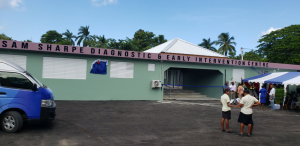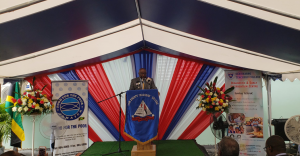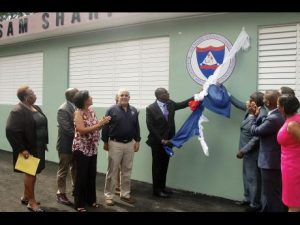Diagnostic Centre for At-Risk Students At Sam Sharpe Teachers’ College
There  is hope for children deemed to be problem students at an early age, but who may be professionally diagnosed with various ailments that interfere with their ability to learn.
is hope for children deemed to be problem students at an early age, but who may be professionally diagnosed with various ailments that interfere with their ability to learn.
A diagnostic and early-childhood intervention centre is now in operation at the Sam Sharpe Teachers’ College (SSTC), where it was officially opened on Tuesday, October 23, 2018 some 18 months after ground was broken on the college’s campus in Granville.
PACE Canada, with the support of Carpenters’ District Council of Ontario, contributed over CAD $108,000 to fund the purchase of furnishings and equipment.
Acting principal of SSTC Dr Lorna Gow-Morrison said the diagnostic and early-intervention centre “was established in an effort to meet the growing demands of children in western Jamaica to gain easier acces s to psycho-educational assessment so that proper interventions and monitoring services can be put in place”.
s to psycho-educational assessment so that proper interventions and monitoring services can be put in place”.
According to her, too often, parents and caregivers were ignorant that academic challenges were sometimes the result of social, physical and emotional factors, and “as we focus on the PEP and other high-stake assessments, this centre will help parents understand that we are in the west to intervene and provide the best opportunities for success to our children”.
The centre will utilise a multi-disciplinary team approach to provide children with direct access to clinicians, who will conduct psycho-educational assessment and developmental screening, as well as consultations with other professionals to address diagnostic questions and offer recommendation for appropriate intervention.
Dr Gow-Morrison announced that “a network of therapeutic services will also be offered, including physical and speech therapy, psychological counselling and remediation classes”.
S he said early intervention to at-risk children would be provided “to get it right” through targeted intervention tailored to meet identified needs. “This inclusive early-childhood programme would, therefore, provide an opportunity for students with and without special needs to learn and play together as they build academic, motor, social and emotional skills needed to ensure success at the early-childhood level and beyond.”
he said early intervention to at-risk children would be provided “to get it right” through targeted intervention tailored to meet identified needs. “This inclusive early-childhood programme would, therefore, provide an opportunity for students with and without special needs to learn and play together as they build academic, motor, social and emotional skills needed to ensure success at the early-childhood level and beyond.”
The programme will not be confined to the rooms in which diagnosis and assessment of students will take place at the centre. Dr Gow-Morrison disclosed that the services will also go mobile. Recognising the extent of the need, she said “we are committed to increasing access to our services by providing a mobile service; this will see us transporting students to this site and also taking our services to sites, assessing needs, collating spread sheets and analysing data to determine further intervention.”
(As published by The Gleaner)


